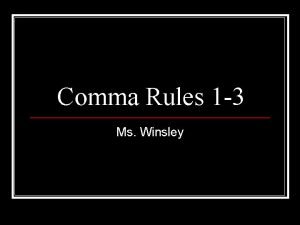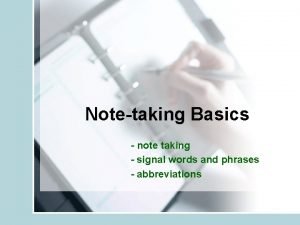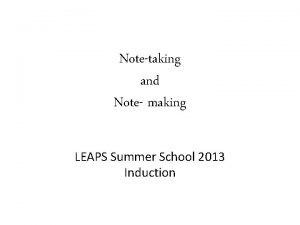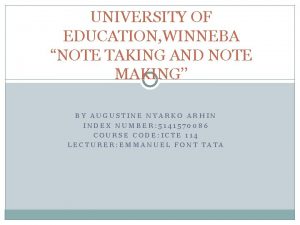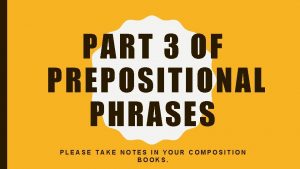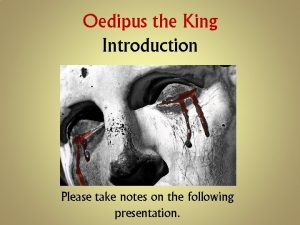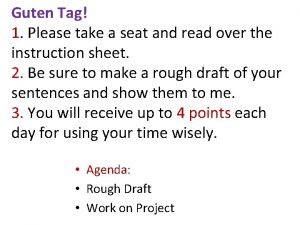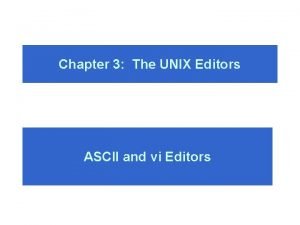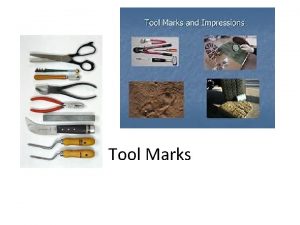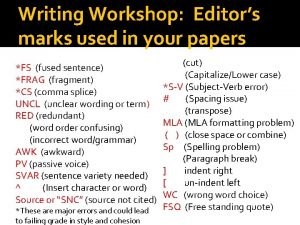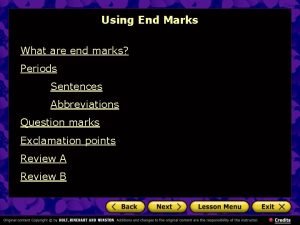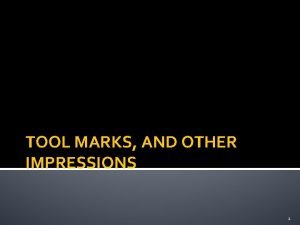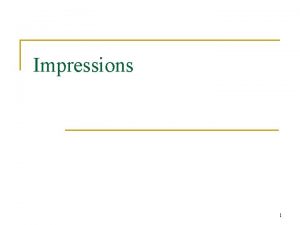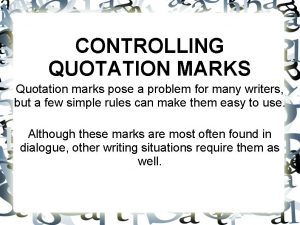Editors Marks Please take note of my editors























- Slides: 23

Editor’s Marks Please take note of my editor’s marks, and take note of what they mean.

Capitalize • – Something needs to be capitalize • The beginning of a sentence, the personal pronoun I, or proper nouns • EXAMPLE • i want to visit norway next summer with my sister lauren. • I want to visit Norway next summer with my sister Lauren.

Lowercase • - You’ve capitalized something that doesn’t need to be. • EXAMPLE • I want to visit Norway next summer with my Sister Lauren. • I want to visit Norway next summer with my sister Lauren.

Omit • - I’ve crossed through something that isn’t imperative to the sentence and should be taken out. • EXAMPLE • I think that Hemingway uses the train station to symbolize a crossroads for the couple. • Hemingway uses the train station to symbolize a crossroads for the couple.

Incorrect • Whatever has been circled is wrong in some way. • Incorrect punctuation, word choice, spacing, etc. • EXAMPLE Jackies new bike was awesome!!!! Jackie’s new bike was awesome!

# Add Space • You simply need an additional space. • Often times this comes with not knowing what words are compound words, and sometimes its just because of your handwriting. • EXAMPLE #Highschool is a real drag. High school is a real drag.

() Close space • You simply need to close up the space in between two words. • EXAMPLE • Cup cakes are yummy and delicious! • Cupcakes are yummy and delicious!

MW Missing Word • In your haste you missed a word, and now your sentence doesn’t make sense. • EXAMPLE MW When Twain writes about the falling in love with Judith he uses indirect characterization. • When Twain writes about the narrator falling in love with Judith he uses indirect characterization.

WW Wrong Word • You’ve used the wrong word. • This frequently occurs with homonyms or when you’re trying to get fancy with your vocabulary • EXAMPLE WW WW • The announcement of knew injustice to the prisoner was disreputable! • The announcement of new injustice to the prisoner was outrageous!

SP Spelling • You’ve spelled something wrong. • This is a super embarrassing mistake to make with titles, author’s names, character’s names – because you should be able to just copy it straight from the book! • EXAMPLE SP SP • Edger Allen Poe frequently writes in the gothic style like in his short story “The Mask of the Red Death. ” • Edgar Allan Poe frequently writes in the gothic style like in his short story “The Masque of the Red Death. ”

SV Subject Verb Agreement • The subject and the verb do not agree. Technically all singular subjects need to have a singular verbs, and all plural subjects should have plural verbs. • ALL singular verbs end in the letter S • EXAMPLE SV The boy want a dog. The boy wants a dog. SINGULAR The boys want a dog. PLURAL

PR Pronoun Reference • You’ve used a pronoun, and it’s not clear what that pronoun refers to. • Common pronouns include: I, me, he, she, we, it, they • EXAMPLE • PR The boy and his father go on vacation to the lake. On the first day he goes fishing. The boy and his father go on vacation to the lake. On the first day the father goes fishing.

T Tense • You’ve either shifted into a different tense, or you’re not writing in the literary present tense. • The literary present refers to the custom of using present tense verbs when writing about events that take place in a work of fiction. • EXAMPLE • T Gatsby discovered that the American dream is not so easily attained. Gatsby discovers that the American dream is not so easily attained.

CS Comma Splice • You’ve spliced a sentence by placing a comma in the wrong spot. • Lots of comma rules are coming your way, but for now if a commas in the wrong location it’ll be marked. • EXAMPLE • CS • It is nearly half past five, we cannot reach town before dark. • It is nearly half past five; we cannot reach town before dark.

RO Run On • A grammatically faulty sentence in which two or more main or independent clauses are joined without a word to connect them or a punctuation mark to separate them • EXAMPLE • RO • The fog was thick he could not find his way home. • The fog was thick; he could not find his way home. • The fog was thick, so he could not find his way home.

F Fragment • You haven’t created a full and complete sentence. This is because you’re missing either a subject, verb, or full and complete thought. • EXAMPLE • F • As his ex-girlfriend Gigi chased him down the interstate, Juan floored the accelerator, weaving through the heavy traffic.

WT Weak Transition • You’ve got an elementary or no transition at all between two points or two paragraphs. • EXAMPLE • WT • Thirdly, Achebe presents the father figure as the archetypal shape shifter. • Third, Achebe presents the father figure as the archetypal shape shifter.

PL Plurality • Something doesn’t add up here. • EXAMPLE • PL • The trees that produce cola nuts are from West Africa, and they are a member of the same family as cocas. • The trees that produce cola nuts are from West Africa, and they are members of the same family as cocas.

MM Misplaced Modifier • You’ve got a phrase or clause placed awkwardly in a sentence so that it appears to modify or refer to an unintended word. • EXAMPLE • MM • Raymond wore his one collared shirt to the job interview, which was unfortunately stained with yellow mustard. • Raymond wore his one collared shirt, which was unfortunately stained with yellow mustard, to the job interview.

PV Passive Voice • A verb is in the passive voice when the subject of the sentence is acted on by the verb. • EXAMPLE PV • The brakes were slammed on by her as the car sped downhill. • She slammed on the brakes as the car sped downhill. ACTIVE VOICE

¶ New Paragraph • You’ve got a new idea so start a new paragraph by moving the sentence to the next line and indenting the start of the new line. • EXAMPLE • ¶ • . . . Marquez’s professor ends up serving as the antagonist. The professor’s assistant therefore becomes his foil. • . . . Marquez’s professor ends up serving as the antagonist. • The professor’s assistant therefore becomes his foil. .

Indent • For formatting purposes you need to indent that line. You can do this by adding five spaces or hitting the TAB key.

{R}Revise ? Confusing AWK Awkward • You’ve got a wonky sentence that doesn’t make sense and needs a little revision. It will be bracketed off with an “R”, “? ”, or “AWK” to show you need to rewrite the whole gosh darn thing so that it’s less confusing, awkward, or plain old terrible.
 Sentences with exclamation mark
Sentences with exclamation mark Will you please be quiet please themes
Will you please be quiet please themes Ms. winsley
Ms. winsley Signal words
Signal words What is credit note and debit note
What is credit note and debit note Difference between note making and note taking
Difference between note making and note taking Note taking and note making
Note taking and note making Goods received note vs delivery note
Goods received note vs delivery note Simple discount notes
Simple discount notes Difference between note making and note taking
Difference between note making and note taking Debit note format
Debit note format Take prepositional phrase
Take prepositional phrase Welcome please take a seat
Welcome please take a seat Please take out some time
Please take out some time Do not throw sausage pizza away
Do not throw sausage pizza away Notes on oedipus the king
Notes on oedipus the king Please take a seat
Please take a seat Sit in your seat
Sit in your seat Slam poetry rubric
Slam poetry rubric Ontology editors
Ontology editors Linkage editor and linking loader
Linkage editor and linking loader Ascii
Ascii Asian council of science editors
Asian council of science editors Take note past tense
Take note past tense


